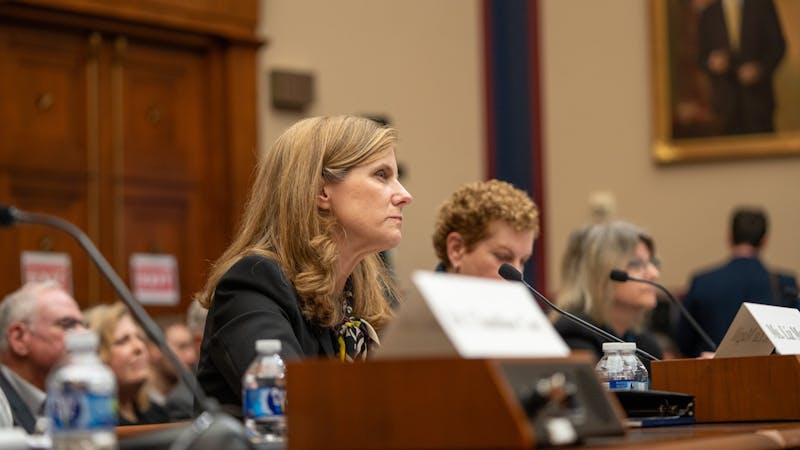
This story is developing and will continue to be updated.
Penn President Liz Magill expressed regret for her statements during Tuesday's congressional hearings in a video released Wednesday evening, pledging to evaluate Penn's policies regarding hate on campus.
Her video statement comes amid mounting scrutiny of her response to a question from Rep. Elise Stefanik (R-N.Y.), who asked whether individuals who call for the genocide of Jewish people violate Penn’s policies or code of conduct. Stefanik described calls for "Intifada revolution" among some protesters on campus as calls for genocide of Jews.
“If the speech turns into conduct, it can be harassment,” Magill told Stefanik at the House Committee on Education and the Workforce hearing, later adding, “It is a context-dependent decision."
This response prompted Stefanik to continue probing.
“This is the easiest question to answer. 'Yes,' Ms. Magill,” Stefanik said. “Conduct meaning committing the act of genocide? ....This is unacceptable, Ms. Magill.”
Magill ultimately reiterated that calling for the genocide of Jews "can be harassment."
"In that moment, I was focused on our University's long standing policies aligned with the U.S. Constitution, which say that speech alone is not punishable," Magill said. "I was not focused on, but I should have been, the irrefutable fact that a call for genocide of Jewish people is a call for some of the most terrible violence human beings can perpetrate."
While her response on Tuesday was ambiguous as to whether such rhetoric would violate the University's policies, she clarified in the video that she did view it as "harassment or intimidation."
"It is intentionally meant to terrify a people who have been subjected to pogroms and hatred for centuries and were the victims of mass genocide in the Holocaust," Magill said.
Magill indicated that she and Provost John Jackson Jr. would initiate a process to examine University policy regarding free speech.
"In today's world, where we are seeing signs of hate proliferating across our campus, in our world in a way not seen in years, these policies need to be clarified and evaluated," she said.
In a post on Instagram following the hearing, the Penn Israel Public Affairs Committee criticized Magill’s answer to Stefanik’s question.
"Calling for the genocide of Jews doesn’t necessarily violate Penn’s rules, but these 5 things do...” the post read.
PIPAC then went on to list activities, such as having scooters within University buildings or playing drinking games, which are against University policy.
In an email to the Penn Hillel community, Rabbi and Executive Director Gabe Greenberg and College juniors and Hillel co-presidents Lauren Krasilovsky and Olivia Domansky also criticized how Magill's statement said that the characterization of calls for genocide depend on context.
"Throughout the hearing, Magill and the other college presidents sought to delineate their support for free speech, no matter how objectionable, so long as it does not turn into violence," the email said.
Magill’s video comes following 24 hours of harsh criticism of her statements from public officials and Penn community members, including from Pennsylvania Gov. Josh Shapiro, who told reporters that Magill’s comments at the hearing were “absolutely shameful.” Harvard University President Claudine Gay and Massachusetts Institute of Technology President Sally Kornbluth have also faced criticism for their responses to similar questions from Stefanik.
The exchange between Stefanik and the three university presidents has garnered national media attention, prompting White House Press Secretary Karine Jean-Pierre to clarify that “we do not stand for genocide. That is unacceptable,” but stopping short of calling for Magill’s resignation, adding that the White House does not “get involved in private university processes and how they run their university.”
The Daily Pennsylvanian is an independent, student-run newspaper. Please consider making a donation to support the coverage that shapes the University. Your generosity ensures a future of strong journalism at Penn.
Donate











